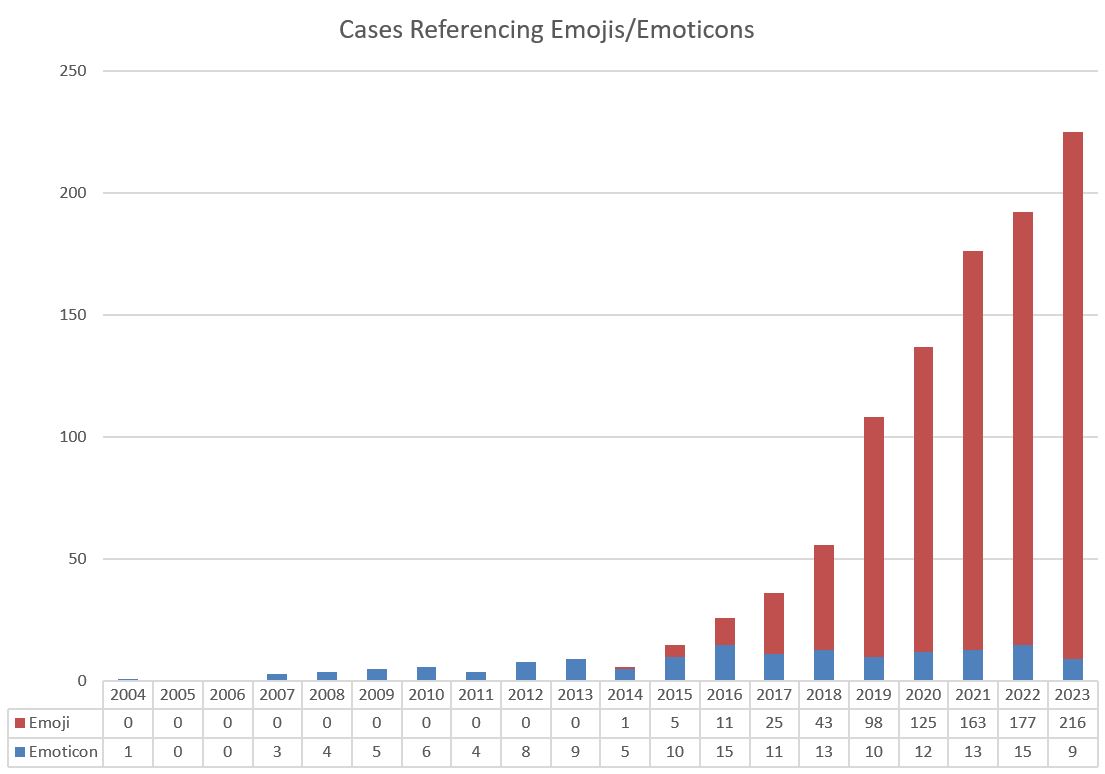2023 Emoji Law Year-in-Review
I continue to maintain my census of U.S. cases referencing emojis or emoticons. In 2023, I logged 225 such cases (this number will grow a bit due to lags with the electronic databases). The case count continues to grow exponentially. The 2023 count represented a 17% increase over the 2022 count.
2023 marked a significant milestone: my census now counts over 1,000 total U.S. cases referencing emojis and emoticons (the exact number is 1,017). Recall the caveat that I can only track cases I can find, so my census surely undercounts the actual number by a lot. And cases that reach the electronic databases are only a small fraction of the total judicial activity involving emojis and emoticons. View the 1,017 cases as a tip of the iceberg when it comes to courts and emojis.
I have posted my updated emoji and emoticon census here. Email me if you see any errors.
* * *
Some other emoji law highlights from 2023:
* A Canadian farmer discovers that a thumbs-up emoji can cost tens of thousands of dollars.
* Tweeting a moon face emoji could constitute stock fraud.
* Similarly, a court says “the ‘rocket ship’ emoji, ‘stock chart’ emoji, and ‘money bags’ emoji objectively mean one thing: a financial return on investment.”
* The “I Love You” emoji isn’t registrable in European Trademark Office.
* A court says the “water” emoji is slang for meta-amphetamines.
* Prisons can’t categorically ban emojis in prisoner correspondence.
* Emojico loses a SAD Scheme case.
* I did a Q&A on emoji law.
* The Free Law Project now allows caselaw searches by Unicode emoji!!! They even call it the “Eric Goldman feature.” 😍😍😍
no credible evidence supports the argument that the three messages from which emojis were omitted were meant to be sarcastic. See, e.g., id. at 116 (Prosecutor: “How do you know th[e emojis] were supposed to indicate [‘we stormed the Capitol’] wasn’t a serious statement?” Ballenger: “Because I know it wasn’t a serious statement.”). Nor would any sarcastic messages make a dent in the myriad communications displaying Defendants’ intent to disrupt congressional proceedings that day. See, e.g., id. at 72, 167 (Ballenger: “[T]he time has come. It’s January 6!!!”); id. at 119, 168 (Price: “[W]e’re just taking over the Capitol.”).”
* “excessive use of emojis could potentially hinder persuasion efforts, as both the source & the message may be perceived as less credible & trustworthy” (my daughter was devastated to learn this).

Pingback: Links for Week of January 26, 2024 – Cyberlaw Central()